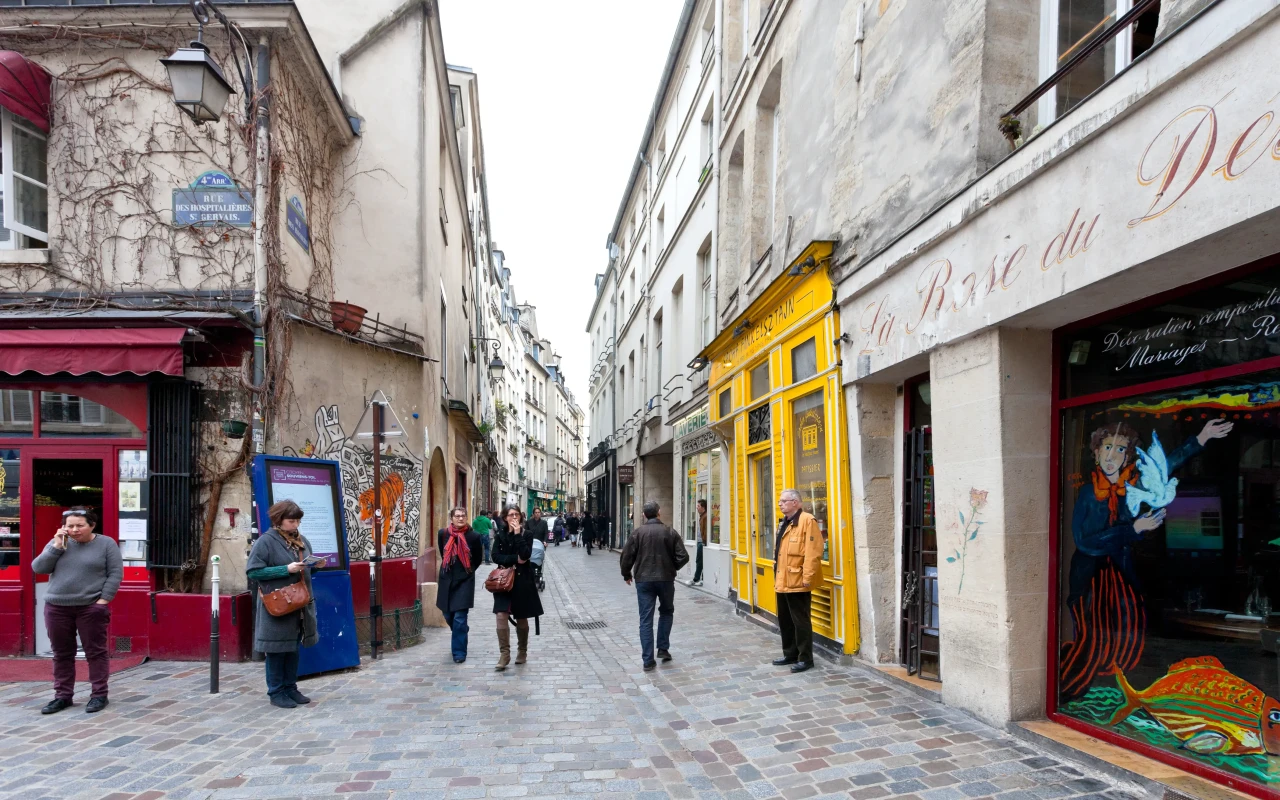Claim to Fame
Le Marais is Paris’s most fashionable and historic district — a captivating mix of medieval streets, Jewish heritage, trendy boutiques, and world-class museums.
📌 Navigating Le Marais : Answers to Frequently Asked Questions
- Admission Fee: Shopping in Le Marais is free, but individual shops and cafes may have different price ranges.
- How Long to Visit: You can spend a couple of hours to a whole day exploring Le Marais.
- Washrooms: Public washrooms are available in cafes and public areas in Le Marais.
- Hours of Operation: Le Marais is open to visitors all day, but shop hours vary.
- Important Information: Le Marais is a historical district with narrow streets and unique boutiques.
- Gift Shop: Unique and charming shops in Le Marais also offer a range of gifts and souvenirs.
- Handicap Accessible: The area around Le Marais is accessible for visitors with disabilities.
- Pets: Pets are generally not allowed inside shops, but some cafes may allow them.
- Guided Tours: Guided tours of Le Marais are available and recommended.
- Restaurant or Cafe: Le Marais has many cafes and restaurants offering a variety of cuisines.
- Picnic Area: There are no designated picnic areas in Le Marais.
- Parking: Parking is available in nearby public garages.
- Family Friendly: Le Marais offers family-friendly shopping and dining options.
- Photography: Le Marais is a picturesque area perfect for photography.
- WIFI: Free public WIFI is available in various spots around Le Marais.
Photos of Le Marais
Situated in the 3rd and 4th arrondissements, Le Marais is one of Paris’s most charming and culturally rich neighborhoods. Its cobbled lanes and centuries-old architecture form a backdrop for modern galleries, chic cafés, LGBTQ+ nightlife, and a deep-rooted Jewish community. It’s where old Paris meets new trends.
What to Expect
Le Marais is a maze of narrow streets filled with character. You’ll find vintage shops, art galleries, patisseries, and some of the city’s most beautiful hôtels particuliers — aristocratic mansions now turned into museums and cultural centers. Rue des Rosiers is a highlight, bustling with falafel vendors and Jewish bakeries.
Major landmarks include the elegant Place des Vosges, the oldest planned square in Paris, and the Musée Carnavalet, which chronicles the history of the city. The district is also home to the Musée Picasso and contemporary art galleries tucked behind heavy wooden doors.
Background and Cultural Context
Le Marais developed during the medieval era and was transformed in the 17th century into a fashionable residential area for nobility. In the 19th and 20th centuries, it became the heart of Paris’s Jewish community. Since the 1980s, it has undergone gentrification and is now a hub for fashion, design, and LGBTQ+ culture.
Despite modern trends, the neighborhood retains its historic integrity. It is one of the few parts of Paris that escaped Haussmann’s 19th-century urban redesign, preserving its medieval street plan and architectural diversity.
Best Time to Visit
Le Marais is lively year-round, but weekday mornings are best for a quiet stroll, while weekends are ideal for people-watching and shopping. Many boutiques close on Mondays, and Rue des Rosiers is busiest on Sunday afternoons.
How to Get There
The area is easily reached by Metro. Use Line 1 to Saint-Paul or Hôtel de Ville, or Line 8 to Chemin Vert. The neighborhood is best explored on foot — walking is the only way to truly experience its charm.
Photo Opportunities
- The red-brick arcades of Place des Vosges
- Colorful storefronts and vintage signage on Rue des Rosiers
- Street art and hidden courtyards
- Picturesque cafés with terrace seating
Travel Tips
- Wear comfortable shoes — the cobblestone streets can be uneven.
- Visit the small museums — many are free or low-cost and packed with character.
- Don’t miss trying a falafel sandwich or a Parisian hot chocolate at a sidewalk café.
- Keep an eye out for open-door galleries and secret gardens tucked behind doors.
FAQs
Is Le Marais safe?
Yes — Le Marais is one of the safest and most tourist-friendly neighborhoods in Paris, especially during the day and early evening.
Are shops open on Sundays?
Unlike most of Paris, many shops in Le Marais do open on Sundays, especially boutiques and food spots.
Is it suitable for families?
Absolutely — the area is walkable and full of charming cafés, bakeries, and quiet squares where families can relax.
Final Thoughts
Whether you're into history, fashion, food, or art, Le Marais offers a little bit of everything with an atmosphere you won’t find anywhere else in Paris. It’s a district that begs to be explored slowly and repeatedly — each visit reveals something new.
